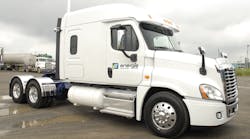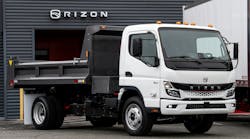A new joint venture aims to develop, certify, and sell dual-fuel “diesel- displacement” systems for existing Class 7 & 8 on-highway trucks. The systems will enable such vehicles to run on a blend made up of diesel and propane or natural gas.
According to the jv partners, retrofitting their “diesel-blend technology” will reduce diesel emissions and provide fuel cost savings of up to 20%.
Formed in the U.S., the venture partners Mascouche, QC-based BL Energie, Inc. with Blossman Services Inc. (BSI), a subsidiary of Ocean Springs, MS-based Blossman Gas Inc. BL Energie provides technology for converting engines to operate on propane autogas.
BSI is a manufacture of record, allowing for the right to apply for EPA and CARB certifications, as well as the exclusive U.S. distributor of Prins Autogas products. Netherlands-based Prins Autogassystemen B.V. is a global developer of alternative-fuel systems.
“We expect to begin marketing our first EPA-certified [diesel blend] system next month,” Jessie Johnson, vp of sales & marketing for Blossman Gas, told FleetOwner. “This system will be for [converting] 14-liter Detroit engines, of model years 2000-2009. Our next platform development will be for Volvo and Mack 13-Liter engines.
“While initially the systems will be offered for aftermarket retro-fit,” he continued, “long term we will offer a QVM program for truck builders.”
Assessing the green impact of the diesel-blending technology, Johnson said that “our diesel-displacement system exceeded all EPA emissions standards for the first certified heavy-duty engine.”
Regarding the projected fuel cost savings of up to 20% to be gained by switching from fueling with diesel to a diesel blend, he said that calculation was “based on our test case over a six-month period of daily driving from central Pennsylvania to upstate New York” that incorporated these factors:
- Diesel costing $3.95 per gallon
- Truck averaging 6.5 MPG
- Diesel-displacement rate of 30%
- Propane costing $2.10 per gallon.
- 140,000 average annual mileage
Johnson noted as well that the “diesel displacement rate can average 35%+, depending on driving characteristics.”
As to why not convert Class 7/8 on-highway diesel engines to run entirely on propane, he explained that “heavy-duty diesel engines are compression-ignited, not spark-ignited-- which is required to operate with propane as a ‘mono fuel.’
“Our system is not a conversion of a diesel engine,” Johnson elaborated, “but rather a dual fuel diesel-displacement system. When our system uses all the propane available in the on- board fuel tank, the system reverts back to [running on] 100% diesel until refueling of the propane.”
He further explained that the diesel-blend system “works by displacing diesel fuel with a carefully calculated amount of propane at all times.
“This prevents the diesel engine from losing a single horsepower on the low end, while eliminating high temperatures and excess horsepower on the high end,” Johnson continued.
“This system is constantly regulated via an electronic control module that monitors all engine parameters while the engine is running to alert the driver of any fault codes or when maintenance is needed,” he pointed out.
Johnson also stressed that it is “not a ‘fumigation system’ that simply adds additional hydrocarbons into the already established fuel stream.
“We are truly displacing required diesel fuel with much cleaner, less expensive propane autogas,” he stated. “And we are doing so in a very controlled system that monitors critical engine requirements and will come with a one-year/100,000-mile engine warranty.”



